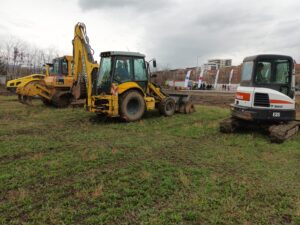- Online survey among 493 EXPO REAL participants
- Subjects: price increases and inflation, climate protection, affordable housing
- Real estate industry to meet again in Munich at the beginning of October
What will the trade fair participants talk about when EXPO REAL, the international trade fair for property and investment, opens its doors in Munich from 4 to 6 October? An online survey conducted prior to the fair sheds light on current trends in the real estate industry: price increases and inflation, ESG, affordable housing and cooperation with the public sector.
“Considering the current general conditions, the real estate industry is entering the fall with subdued expectations for the real estate market. Just under half of the respondents to the EXPO REAL Trend Index believe that investments in German real estate will decrease, a quarter expect it to remain at the same level at most. The need to discuss the challenges is correspondingly high. The strong participation of about 1,900 exhibitors at EXPO REAL—nearly 60 percent more than last year and coming close to pre-pandemic levels—also proves this,” says Stefan Rummel, CEO of Messe München. 493 German trade show participants took part in the online survey, both decision-makers from exhibiting companies and visitors. The survey was conducted in July by the independent market research institute IfaD on behalf of EXPO REAL.
ECB’s interest rate policy mainly considered positive
As a result of the upheavals caused by the war in the Ukraine, the real estate industry is primarily concerned with inflation and interest rate policy. When it comes to the most important influencing factors and challenges, climate protection is in third place. Expectations for market development are accordingly subdued: almost half of those surveyed (48 percent) believe that the amounts of money invested in German real estate will decrease, whereas 26 percent each expect them to remain the same or increase. Most respondents gave a positive assessment of the interest rate hikes by the European Central Bank: 61 percent think that the central bank is thus ending the real estate boom, and 67 percent assume that real estate financing will now become more realistic.
Another major challenge for large parts of the real estate industry are the ESG (environmental, social, governance) requirements, not only for fund products. Nearly a quarter of respondents are still unclear about this. However, 43 percent consider ESG criteria to be the approach to take.
Impossible without cooperation with the public sector
From affordable housing to climate-resilient cities: the survey reveals that sustainable urban development can only be accomplished if politics and business join forces. In terms of climate protection in cities, the respondents from the real estate industry are primarily focusing on better public infrastructure and generally ecological urban development. 65 percent call for more commitment on the part of the public sector to develop infrastructure in the cities. Half are convinced that private/public partnership models will regain importance. 59 percent would also like to see closer cooperation in housing construction, while 72 percent want to work on simplifying regulations in this field. It is widely recognized that the state cannot address the lack of affordable housing on its own.
High importance of care and residential properties
In the survey, care and residential properties are rated as the types of property with the highest increase in importance (69 and 68 percent respectively). The segments of healthcare (54 percent), logistics (also 54 percent) and mixed-use property (53 percent) take 3rd, 4th and 5th place. Looking at the office segment, two thirds of respondents predict strong growth for the co-working trend in the future as well. In the retail sector, specialty stores enjoy a high level of popularity (69 percent), well ahead of street stores (46 percent), shopping centers (23 percent) or factory outlets (15 percent). In the residential property segment, senior housing (82 percent) and subsidized housing / social housing (80 percent) are at the very top of the rankings. Those investing in residential, office and/or mixed-use properties remain true to their respective investment strategies: 89 percent say they do not plan to shift between the segments. According to the survey, the most coveted locations for residential and office properties are primarily B and C locations in the catchment area of major cities.












































